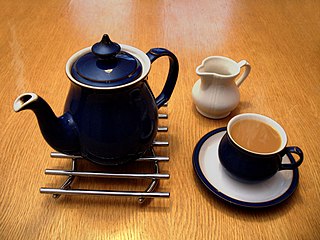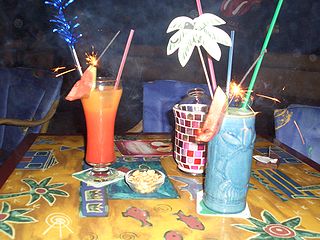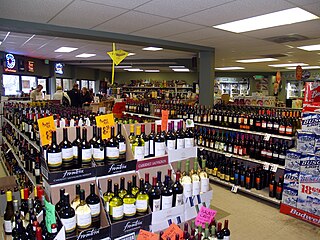
A drink or beverage is a liquid intended for human consumption. In addition to their basic function of satisfying thirst, drinks play important roles in human culture. Common types of drinks include plain drinking water, milk, juice, smoothies and soft drinks. Traditionally warm beverages include coffee, tea, and hot chocolate. Caffeinated drinks that contain the stimulant caffeine have a long history.

Mulled wine, also known as spiced wine, is an alcoholic drink usually made with red wine, along with various mulling spices and sometimes raisins, served hot or warm. It is a traditional drink during winter, especially around Christmas. It is usually served at Christmas markets in Europe, primarily in Germany, Austria, and eastern France. There are non-alcoholic versions of it. Vodka-spiked mulled wine can be found in Polish Christmas markets, where mulled wine is commonly used as a mixer.

A mixed drink is a beverage in which two or more ingredients are mixed.

Palm wine, known by several local names, is an alcoholic beverage created from the sap of various species of palm tree such as the palmyra, date palms, and coconut palms. It is known by various names in different regions and is common in various parts of Africa, the Caribbean, South America, South Asia, Southeast Asia and Micronesia.

Ethyl carbamate (also called urethane) is an organic compound with the formula CH3CH2OC(O)NH2. It is an ester of carbamic acid and a white solid. Despite its name, it is not a component of polyurethanes. Because it is a carcinogen, it is rarely used, but naturally forms in low quantities in many types of fermented foods and drinks.

Arak or araq is a distilled Levantine spirit of the anise drinks family. It is translucent and unsweetened.

Rice wine is a generic term for an alcoholic beverage fermented and possibly distilled from rice, traditionally consumed in East Asia, Southeast Asia and South Asia. Rice wine is made by the fermentation of rice starch that has been converted to sugars. Microbes are the source of the enzymes that convert the starches to sugar. Sake in Japan, Mijiu in China, and Cheongju and Makgeolli in Korea are some of the most notable types of rice wine.

Apéritifs and digestifs are drinks, typically alcoholic, that are normally served before (apéritif) or after (digestif) a meal respectively.

Liquor is an alcoholic drink produced by the distillation of grains, fruits, vegetables, or sugar that have already gone through alcoholic fermentation. Other terms for liquor include: spirit, distilled beverage, spirituous liquor or hard liquor. The distillation process concentrates the liquid to increase its alcohol by volume. As liquors contain significantly more alcohol (ethanol) than other alcoholic drinks, they are considered "harder." In North America, the term hard liquor is sometimes used to distinguish distilled alcoholic drinks from non-distilled ones, whereas the term spirits is more commonly used in the UK. Some examples of liquors include vodka, rum, gin, and tequila. Liquors are often aged in barrels, such as for the production of brandy and whiskey, or are infused with flavorings to form flavored liquors, such as absinthe.

A liquor store is a retail business that predominantly sells prepackaged liquors, wine or beer, usually intended to be consumed off the store's premises. Depending on region and local idiom, they may also be called an off-licence, off-sale, bottle shop, bottle store or, colloquially, bottle-o, liquor store or other similar terms. A very limited number of jurisdictions have an alcohol monopoly. In US states that are alcoholic beverage control (ABC) states, the term ABC store may be used.
Alcoholic beverage control states, generally called control states, less often ABC states, are 17 states in the United States that have state monopoly over the wholesaling or retailing of some or all categories of alcoholic beverages, such as beer, wine, and distilled spirits.

Purposeful production of alcoholic drinks is common and often reflects cultural and religious peculiarities as much as geographical and sociological conditions.
Aragh sagi is a type of Iranian moonshine. This distilled alcoholic beverage usually contains around 50% alcohol. However, since it is produced illicitly, it may contain more or less alcohol, at times even reaching 80%. A high-quality aragh sagi tastes similar to grappa. Some Western sources call it "Persian vodka".
An alcohol-free or non-alcoholic drink, also known as a temperance drink, is a version of an alcoholic drink made without alcohol, or with the alcohol removed or reduced to almost zero. These may take the form of a non-alcoholic mixed drink or non-alcoholic beer, and are widely available where alcoholic drinks are sold.

A liquor license is a governmentally issued permit to sell, manufacture, store, or otherwise use alcoholic beverages.

Alcoholic beverages appear in the Hebrew Bible, after Noah planted a vineyard and became inebriated. In the New Testament, Jesus miraculously made copious amounts of wine at the wedding at Cana. Wine is the most common alcoholic beverage mentioned in biblical literature, where it is a source of symbolism, and was an important part of daily life in biblical times. Additionally, the inhabitants of ancient Israel drank beer, and wines made from fruits other than grapes, and references to these appear in scripture. However, the alcoholic content of ancient alcoholic beverages were significantly lower than modern alcoholic beverages. The low alcoholic content was due to the limitations of fermentation and nonexistence of distillation methods in the ancient world. Rabbinic teachers wrote acceptance criteria on consumability of ancient alcoholic beverages after significant dilution with water, but prohibited undiluted wine.

An alcoholic beverage is a drink that contains ethanol, a type of alcohol that acts as a drug and is produced by fermentation of grains, fruits, or other sources of sugar. The consumption of alcoholic drinks, often referred to as "drinking", plays an important social role in many cultures. Most countries have laws regulating the production, sale, and consumption of alcoholic beverages, and the temperance movement advocates against the consumption of alcoholic beverages. Regulations may require the labeling of the percentage alcohol content and the use of a warning label. Some countries ban such activities entirely, but alcoholic drinks are legal in most parts of the world. The global alcoholic drink industry exceeded $1 trillion in 2018.

The state laws governing alcoholic drinks in New Jersey are among the most complex in the United States, with many peculiarities not found in other states' laws. They provide for 29 distinct liquor licenses granted to manufacturers, wholesalers, retailers, and for the public warehousing and transport of alcoholic drinks. General authority for the statutory and regulatory control of alcoholic drinks rests with the state government, particularly the Division of Alcoholic Beverage Control overseen by the state's Attorney General.

Alcohol laws are laws in relation to the manufacture, use, being under the influence of and sale of alcohol or alcoholic beverages that contains ethanol. Common alcoholic beverages include beer, wine, (hard) cider, and distilled spirits. The United States defines an alcoholic beverage as "any beverage in liquid form which contains not less than one-half of one percent of alcohol by volume", but this definition varies internationally. These laws can restrict those who can produce alcohol, those who can buy it, when one can buy it, labelling and advertising, the types of alcoholic beverage that can be sold, where one can consume it, what activities are prohibited while intoxicated., and where one can buy it. In some cases, laws have even prohibited the use and sale of alcohol entirely, as with Prohibition in the United States from 1920 to 1933.

Tapuy, also spelled tapuey or tapey, is a rice wine produced in the Philippines. It is a traditional beverage originated from Banaue and the Mountain Province, where it is used for important occasions such as weddings, rice harvesting ceremonies, fiestas and cultural fairs. It is produced from either pure glutinous rice or a combination of glutinous and non-glutinous rice together with onuad roots, ginger extract, and a powdered starter culture locally known as bubod. Tapuy is an Ilocano name. The wine is more commonly called baya or bayah in Igorot languages.
















